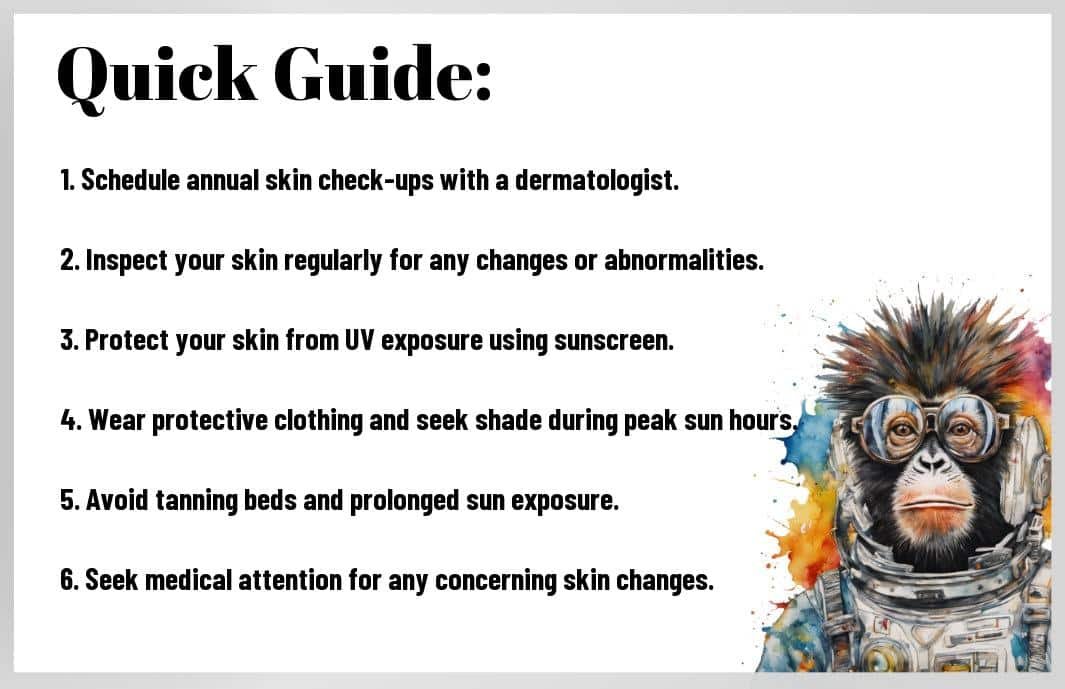FAQ
Q: Why is regular skin check-up important for skin cancer prevention?
A: Regular skin check-ups are crucial for early detection of skin cancer. By detecting any changes in your skin early, you can increase the chances of successful treatment.
Q: How often should I get a skin check-up?
A: It is recommended to get a professional skin check-up at least once a year. However, if you have a history of skin cancer or other risk factors, more frequent check-ups may be necessary.
Q: What should I expect during a skin check-up?
A: During a skin check-up, a dermatologist will thoroughly examine your skin for any suspicious moles, growths, or changes. They may also use dermoscopy to get a closer look at any unusual spots.
Q: What are the signs of skin cancer that I should watch out for?
A: Watch out for any new moles or growths, changes in existing moles, asymmetrical moles, irregular borders, uneven color, or moles that are larger than a pencil eraser. If you notice any of these signs, it’s important to get them checked by a professional.
Q: Can I do self-checks for skin cancer at home?
A: Yes, you can and should do regular self-checks for skin cancer at home. Keep an eye on your skin and look for any changes that could be concerning. However, a professional check-up is still essential for a thorough examination.
Q: Are there any lifestyle changes I can make to prevent skin cancer?
A: Absolutely. Protect your skin from the sun by wearing sunscreen, protective clothing, and seeking shade. Avoid tanning beds and be mindful of your sun exposure, especially during peak hours.
Q: What are the risk factors for developing skin cancer?
A: Risk factors include fair skin, history of sunburns, excessive sun exposure, family history of skin cancer, and a weakened immune system. It’s important to be aware of these risk factors and take extra precautions if they apply to you.
The Skin We Live In: Understanding Its Role and Risks
The human skin is the largest organ in the body, and yet it often gets overlooked when it comes to health and wellness. Understanding the importance of regular skin check-ups and the risks associated with neglecting our skin is crucial in preventing skin cancer and other dermatological issues.
The Largest Organ You Never Paid Much Attention To
With all the focus on internal organ health, it’s easy to forget about the skin, our body’s first line of defense against the outside world. But the truth is, our skin plays a vital role in protecting us from harmful UV rays, infections, and injuries. Regular skin check-ups are essential in maintaining skin health and catching any potential issues early on.
How and Why Skin Cancer Sneaks Up on Us
Role Skin cancer can sneak up on us because it often develops silently, without causing any noticeable symptoms in the early stages. Many people assume that skin cancer only affects those who spend a lot of time in the sun, but the reality is that anyone can develop skin cancer, regardless of their sun exposure. Regular skin check-ups can help detect any abnormal changes in the skin and prevent the progression of skin cancer.
Also Read: The Journey To Flawless Skin – Inside The World Of Laser Skin Care Hospitals
Never underestimate the importance of regular skin check-ups, as they can save lives by detecting skin cancer in its early, more treatable stages. Being proactive about our skin health is the key to preventing the devastating effects of skin cancer.
Key Takeaways:
- Early Detection: Regular skin check-ups can help in early detection of any suspicious moles or lesions, leading to timely intervention and treatment.
- Reduce Risk: By monitoring changes in the skin and seeking professional advice, individuals can reduce the risk of developing skin cancer and other potentially harmful skin conditions.
- Peace of Mind: Getting regular skin check-ups can provide peace of mind, as any concerns can be addressed promptly, and individuals can be proactive about their skin health.

Types of Skin Cancer: Know Your Enemy
One of the most critical aspects of skin cancer prevention is understanding the different types of skin cancer and their characteristics. By knowing your enemy, you can take the necessary steps to protect yourself and your loved ones.
Also Read: Combatting Common Skin Concerns – Expert Advice From A Skincare Specialist
| Type | Description |
| Melanoma | The most dangerous and aggressive form of skin cancer. |
| Basal Cell Carcinoma | The most common form of skin cancer, typically appears as a pearly bump or a pink growth. |
| Squamous Cell Carcinoma | Often appears as a firm, red nodule or a flat lesion with a scaly, crusty surface. |
| Merkel Cell Carcinoma | A rare and aggressive skin cancer that often develops on sun-exposed areas. |
| Sebaceous Gland Carcinoma | An extremely rare and aggressive form of skin cancer that originates in the oil glands. |
Melanoma Madness: The Big, Bad Beast
Know this: melanoma is the big, bad beast of skin cancer. It’s the most dangerous and aggressive form, capable of spreading quickly to other parts of your body if not caught early.
Early detection is key, my friend. That’s why regular skin check-ups and self-examinations are crucial in keeping this beast at bay. Look out for any changes in your skin, moles that are asymmetrical, have irregular borders, or have multiple colors. If you notice anything suspicious, get it checked out immediately.
Non-Melanoma Mayhem: When The ‘Less Dangerous’ Can Still Hurt
Your skin is your armor, but even the ‘less dangerous’ forms of skin cancer can still pack a punch. Basal cell carcinoma and squamous cell carcinoma may not be as aggressive as melanoma, but they can still cause significant damage if left untreated.
To protect yourself, avoid prolonged sun exposure, wear protective clothing and sunscreen, and don’t skip those routine skin check-ups. It’s better to be safe than sorry, especially when it comes to your health.
Also Read: The Science Behind Laser Skin Care – Your Guide To A Flawless Complexion
To catch these ‘less dangerous’ forms of skin cancer early, pay attention to any changes in your skin, including new growths, sores that don’t heal, or changes in existing moles. When in doubt, get it checked out, my friends. Prevention is always better than cure.
Rare and Ruthless: The Skin Cancer You Never Heard Of
Rare, but ruthless. That’s the best way to describe sebaceous gland carcinoma. This incredibly uncommon skin cancer may not be on your radar, but it’s worth being aware of its existence.
Melanoma may get all the attention, but remember, knowledge is power. Stay informed about the various types of skin cancer, no matter how rare they may be. Your health is worth the effort.
Also Read: Spotting Skin Cancer – Identifying Suspicious Moles And Lesions

Risk Factors: Playing Skin Cancer Roulette
Now, let’s talk about the risk factors of skin cancer. It’s like playing a game of roulette with your skin, and the stakes couldn’t be higher. There are several key factors that can significantly increase your risk of developing skin cancer.
- Excessive sun exposure
- Family history of skin cancer
- Compromised immune system
- Exposure to certain chemicals and radiation
Recognizing these risk factors is crucial in taking proactive steps to protect your skin and prevent skin cancer.
The Sun: Friend or Foe?
To some, the sun is a delightful friend, offering warmth and Vitamin D. But let’s not forget, sun exposure can also be a treacherous foe when it comes to your skin’s health. While the sun offers some benefits, it’s essential to be mindful of the potential dangers it poses to your skin.
Also Read: Youthful Skin At Any Age – Discover The Anti-Aging Secrets Of Reputed Skin Clinics
Genes and Jeans: What Your Family and Lifestyle Do to Your Skin
Cancer. It’s a word that strikes fear into the hearts of many. But what if I told you that your family history and lifestyle choices could influence your risk of developing skin cancer? It’s not just about the genes you inherit, but also the habits you adopt that can impact the health of your skin.
What you do and how you live can determine whether your skin will be thriving or at risk.
The Unexpected Culprits: From Your Workplace to Your Holiday
For many, the dangers to the skin aren’t just from the blazing sun. They can lurk in your workplace and even in your favorite holiday destinations. From exposure to hazardous chemicals to the harmful effects of tanning beds, these unexpected culprits can pose a serious threat to your skin’s well-being.
From the office to the beach, your skin is constantly under attack from various sources, so it’s crucial to be aware of the potential risks.
Your Skin Checks 101: A Step-By-Step Guide to Taking Your Skin’s Health Into Your Own Hands
Hey there, skin warriors! Today, we’re diving into the nitty-gritty of skin checks and why they are absolutely crucial for your overall well-being. But first things first, let’s check out this The Importance Of Monthly Skin Checks: Tips For Skin Cancer Prevention for some expert insight.
| When to Begin: Timing is Everything | The How-To: Techniques That Could Save Your Life |
| Begin your skin checks at a young age and make it a regular habit. Early detection is key in preventing serious skin issues, so don’t wait until it’s too late. | With skin checks, you’ll want to focus on using the ABCDE method: asymmetry, border irregularity, color variation, diameter, and evolving. Early detection could save your life! |
Plus, be sure to pay attention to any new or changing moles, freckles, or spots on your skin. If something looks off, don’t hesitate to get it checked out by a professional.
Tools of the Trade: What Works and What’s Gimmick
Your skin is your largest organ, so treat it right! Stick to the basics like a good quality sunscreen, protective clothing, and regular moisturizing. Don’t fall for gimmicky products that promise the world but deliver nothing but disappointment.
Tools such as magnifying mirrors, skin mapping apps, and dermatoscope can also be helpful in keeping track of changes in your skin. Stay educated on the latest technology and tools that can aid in your skin health journey.
Professional Check-Ups: Going Beyond the Bathroom Mirror
Unlike the quick glances in the bathroom mirror, professional skin check-ups provide a comprehensive assessment of your skin health. Dermatologists have the expertise and tools to detect potential issues early, helping you prevent skin cancer and other serious conditions.
Partnering with a dermatologist ensures that you have a dedicated expert on your side, guiding you in the right direction to keep your skin healthy and vibrant. Regular check-ups play a crucial role in early detection and treatment, giving you peace of mind and confidence in your skin’s well-being.
Dermatologists and You: A Partnership for Your Skin
Check-ups with a dermatologist are not just about treating skin issues when they arise, but also about preventing them from developing in the first place. By working closely with your dermatologist, you can develop a personalized plan for skin care and stay ahead of any potential problems.
Regular appointments with a dermatologist can help you maintain a proactive approach to your skin health, ensuring that any changes or abnormalities are addressed promptly and effectively.
What to Expect When You’re Inspected
Dermatologists are trained to perform thorough examinations of your skin, checking for any irregularities, moles, or lesions. They may use various tools such as dermatoscopes to get a closer look at specific areas of concern.
Any suspicious findings will be further evaluated through biopsies or other diagnostic procedures to determine the best course of action. Dermatologists can also provide guidance on self-examination techniques, empowering you to monitor your skin in between appointments.
The Pros and Cons: Weighing the Cost Against Your Health
Professional skin check-ups come with both advantages and considerations that are important to weigh. Let’s break it down:
| Pros | Cons |
| Early detection of skin cancer | Potential cost of procedures |
| Peace of mind and reassurance | Time commitment for appointments |
| Expert guidance for skin care | Possible anxiety about findings |
| Proactive approach to skin health | Impact on daily activities |
Youre empowered to make informed decisions about your skin health, weighing the benefits of professional check-ups against the potential drawbacks. It’s essential to consider the long-term impact on your well-being and take the necessary steps to prioritize your skin health.

Prevention Tips: The Power of Being Proactive
To prevent skin cancer, it’s crucial to be proactive about your skin health. Here are some tips to help you stay on top of your skin cancer prevention game:
- Regular skin check-ups with a dermatologist or skin cancer specialist
- Stay informed about the signs of skin cancer and perform self-examinations regularly
- Use sunscreen with a high SPF and reapply it every two hours
- Seek shade and avoid prolonged exposure to UV rays
- Wear protective clothing and accessories like wide-brimmed hats and sunglasses
Recognizing early signs and taking preventative measures can make all the difference in protecting yourself against skin cancer.
The Sunscreen Saga: Myth-busting and Must-dos
Proactive use of sunscreen is essential in the battle against skin cancer. Don’t fall for the myths – always use a broad-spectrum sunscreen with an SPF of 30 or higher, apply it generously, and reapply it throughout the day, especially after swimming or sweating. Sunscreen is your shield against UV damage, so make it a non-negotiable part of your daily routine.
Lifestyle Adjustments: Small Changes, Big Impact
One of the most powerful ways to prevent skin cancer is to make small adjustments to your lifestyle. Protecting your skin goes beyond just using sunscreen – it also involves wearing protective clothing, seeking shade, and avoiding peak sun hours. It’s all about creating healthy habits to shield yourself from harmful UV rays.
It starts with small changes, but the impact on your skin health is enormous. It’s about being conscious and intentional in your daily choices to protect yourself from the dangers of UV exposure.
On Diet and Skin Health: Fueling Fortification Against Cancer
Lifestyle choices, including diet, play a crucial role in skin health and cancer prevention. Consuming a diet rich in antioxidants and omega-3 fatty acids can fortify your skin against the effects of UV radiation. Additionally, staying hydrated and limiting alcohol consumption can further protect your skin from damage. Lifestyle adjustments extend beyond sunscreen and clothing – what you put into your body is just as important in preventing skin cancer.
Any positive changes you make in your diet</strong and lifestyle can work in tandem with sun protection to build a solid defense against the risks of skin cancer.
Navigating Treatment Options: From Diagnosis to Victory
Despite the alarming rise in skin cancer cases, there is hope in the form of various treatment options available today. Once diagnosed, it’s crucial to explore and understand the available treatments to make informed decisions about the best course of action. Navigating through the treatment options may seem overwhelming, but with the right information and guidance, it’s possible to conquer skin cancer and emerge victorious.
Cutting It Out: Surgical Options and Outcomes
The surgical approach to treating skin cancer involves removing the cancerous tissue through various procedures such as Mohs surgery, excision, or curettage. The success rates for surgical treatment are excellent, with high cure rates and low recurrence. It’s imperative to consult with a skilled dermatologic surgeon to determine the most suitable surgical option based on the type, size, and location of the skin cancer.
The Non-Surgical Arsenal: Creams, Lasers, and Pills
Pills, creams, and laser therapies are part of the non-surgical arsenal for treating skin cancer. Topical creams containing imiquimod or 5-fluorouracil can be applied directly to the skin cancer, targeting abnormal cells. Laser therapy and photodynamic therapy are also effective in treating superficial skin cancers. It’s essential to consult with a dermatologist to assess the feasibility of these non-surgical options based on individual circumstances.
Creams and lasers offer a less invasive treatment option for superficial skin cancers, while pills provide an alternative for certain cases of basal cell carcinoma, squamous cell carcinoma, and actinic keratosis.
Holistic Approaches: Complementing Medical Treatment With Wellness
An integrated approach to skin cancer treatment involves lifestyle modifications, complementary therapies, and stress-reducing practices. Healthy nutrition, regular exercise, and mindfulness can support the body’s healing process and overall well-being during and after medical treatment. Embracing holistic approaches alongside medical treatment can optimize the chances of successful skin cancer recovery.
Any holistic approach should be integrated into the overall treatment plan with the supervision of healthcare professionals, to ensure synergy with medical interventions and promote comprehensive healing.

Staying Vigilant: Aftercare and Avoiding Recurrence
Not only is it crucial to catch skin cancer early, but it’s equally important to stay vigilant after treatment to avoid recurrence. After battling skin cancer, the last thing you want is for it to come back with a vengeance. Regular follow-up appointments and diligent self-checks are essential to keep cancer at bay. By staying on top of your aftercare, you can increase the chances of catching any signs of recurrence early and taking necessary action.
The Follow-up Files: Keeping Cancer in Check
Check in with your dermatologist as scheduled and don’t skip any follow-up appointments. These appointments are not just routine – they are your line of defense against cancer’s return. Your dermatologist can conduct thorough skin checks and identify any potential concerns that may need further attention. Additionally, don’t forget to keep an eye out for any changes in your skin between appointments and report them promptly. Staying proactive is key to keeping cancer in check.
Lifestyle Post-Treatment: Adjustments and Adherence
One of the most crucial aspects of life after skin cancer treatment is adhering to lifestyle adjustments recommended by your healthcare team. Adherence to a sun-safe lifestyle, including wearing protective clothing and seeking shade, is vital to prevent the recurrence of skin cancer. Developing healthy habits that prioritize sun protection can make all the difference in your ongoing health.
For instance, incorporate daily sunscreen use into your routine, and be mindful of sun exposure during peak UV hours. Remember, prevention is always better than cure, and being proactive about your sun safety can significantly reduce the risk of skin cancer recurrence.
Also Refer : Unveiling The Benefits Of Professional Skincare Treatments – Your Path To Flawless Skin
The Sunscreen Sequel: Protection as a Way of Life
An essential part of post-treatment life is incorporating sunscreen into your daily regimen as a non-negotiable. The use of broad-spectrum sunscreen with at least SPF 30 is a powerful tool in protecting your skin from harmful UV rays. Make sunscreen application a habit, not just something you do at the beach. Adherence to sunscreen use can greatly reduce the risk of skin cancer recurrence and ultimately contribute to your overall well-being.









